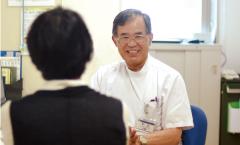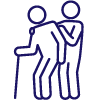- 요코하마시 톱 페이지
- 나카구 톱페이지
- 여러 단어 (Multilingual)
- English
- Public Relations Magazines
- Koho Yokohama Naka Ward Version(~2023)
- 2020
- August - What you need to know about dementia
여기에서 본문입니다.
August - What you need to know about dementia
Digest version of Koho(Public Relations) Yokohama Naka Ward edition (홍보야코하마 나카 구판)
Last updated date:2020/8/7
What you need to know about dementia
Dementia is a common condition. In fact, 1 in 4 people aged 65 years or above have dementia or are at risk of developing dementia. And dementia can affect anyone.
Therefore, it is important for everyone to know the facts about dementia and to show understanding so as to allow those with dementia to continue living in peace of mind in their familiar surroundings.

Mr. Takahiro Sugiyama
Vice-representative of the Board of Directors, Alzheimer’s Association Japan
Director, Kawasaki Saiwai Clinic
Increasing difficulty in coping with daily life tasks = an indication of dementia
Everyone is forgetful from time to time, but is still able to carry on in daily life as usual. But your life would be thrown into turmoil if you were regularly unable to recall the names of family members or kept forgetting things. Dementia is a condition which causes a person’s intellectual functioning to decline, which in turn has a serious impact on that person’s ability to conduct a normal life.
Guidelines for detecting dementia at an early stage
The key to detecting dementia at an early stage is to realize that you or someone else is somehow “different to usual.” Please use the following list to check for yourself. Of course, it is not possible to determine whether or not someone has dementia on the basis of this list alone, but you or someone you know many have dementia if several of the following apply.
□I sometimes forget today’s date or the day of the week
□I sometimes forget my address or telephone number
□I say or ask the same thing repeatedly
□I sometimes go to pay for something at the shop but cannot work out how much
□I sometimes cannot remember the names of things
□I forget where I put things and forget to put things away more often than before
□I sometimes get lost when walking along familiar routes
□I have become easily irritated by trivial things
□I am no longer able to turn off the gas or fire by myself
□I am no longer able to operate the washing machine, remote controller, etc. that I have been using until now
□I sometimes find it hard to understand the content of books or follow the storyline in a TV drama
□I often think that someone has stolen my wallet, watch, etc.
□I sometimes forget what I wanted to say in the middle of talking
□I have become unkempt in appearance
□I have no motivation to do anything despite being well physically.
If 6 or more of the above apply to you or someone you know, I encourage you to speak to a doctor to receive a proper diagnosis.
Source: 인지증의 올바른 지식 (To those who are concerned)
about becoming more forgetful: A proper understanding of dementia)”
(Publisher) NHK Public Welfare Organization (Editor) Kenji Kosaka
Tips for seeking medical advice
There are many benefits of seeking an early diagnosis. You may need to think of some creative ways to persuade the person in question to go to a doctor if he or she shows reluctance.
- Consult at a nearby medical institution, such as your regular internal medicine doctor or a dementia clinic
- Caregivers should accompany the individual concerned to his or her hospital appointment
- Take a memo of the progression of symptoms, things the individual is having trouble with, and any other requests for the medical examination, and hand it over at the reception desk
Even young people sometimes develop dementia
Dementia can also affect young people. This is known as early-onset dementia. Younger patients often lack adequate financial resources, making the situation even more serious for their caregivers.
Hardships of caregivers that others may find hard to understand
People may find it hard to understand or imagine how it would feel to suffer the kinds of symptoms that would lead you to forget the faces of family members. What is more, dementia sufferers are often able to talk to and respond to questions from others normally, giving the impression that there is nothing wrong with them. This is why others sometimes find it hard to understand when family members talk about their hardships.

Therefore, if those suffering from dementia and their families are to continue living in peace of mind, it is necessary for everyone to gain a fuller understanding of dementia and provide comprehensive support to both the individual concerned and their caregivers.
Enabling anyone who develops dementia to continue living in peace of mind in their familiar surroundings
Caravan Mates
This program trains individuals to become dementia supporters with a proper understanding of dementia and the capability to provide patients and their families with warm support in the community and in the workplace. Caravan Mates are people who work as instructors on courses which train these dementia supporters. They work on the ground to increase the number of supporters in the hope of building a more considerate society.

Ms. Noriko Shirai
Holds visiting courses at neighborhood associations in Area 4 North
During these courses, I use skits to get participants to observe interactions between dementia patients and their families, and think about how they would act in such a situation. Following this, I give a talk on recommended responses, and convey the key points for when dealing with people who have dementia. Some participants have told me that my advice helped them know how to act in actual situations. I hope to continue raising awareness among people and learn with my fellow Mates so as to be able to provide a source of support to caregivers.
Dementia consultations
Eligibility: Those who wish to consult about dementia and other memory-related problems along with their families
Where to go: Koreisha Shien Tanto (Elderly Support Section), Naka Ward Office
Counselling for caregivers
Eligibility: Families caring for dementia patients, etc.
Where to go: Koreisha Shien Tanto (Elderly Support Section), Naka Ward Office

Consultation services/organizations
Koreisha Shien Tanto (Elderly Support Section), Naka Ward Office TEL:224-8167 FAX:224-8159
Community General Support Center (within Community Care Plazas)
Shinyamashita Community Care Plaza TEL:625-1911 FAX:625-1865
Furocho Community Care Plaza TEL:662-0161 FAX:662-0192
Mugita Community Care Plaza TEL:664-6023 FAX:664-6075
Honmokuhara Community Care Plaza TEL:623-0971 FAX:623-0977
Minosawa Community Care Plaza TEL:663-6960 FAX:228-1828
Honmokuwada Community Care Plaza TEL:622-1211 FAX:622-1290
페이지 ID:121-508-705












